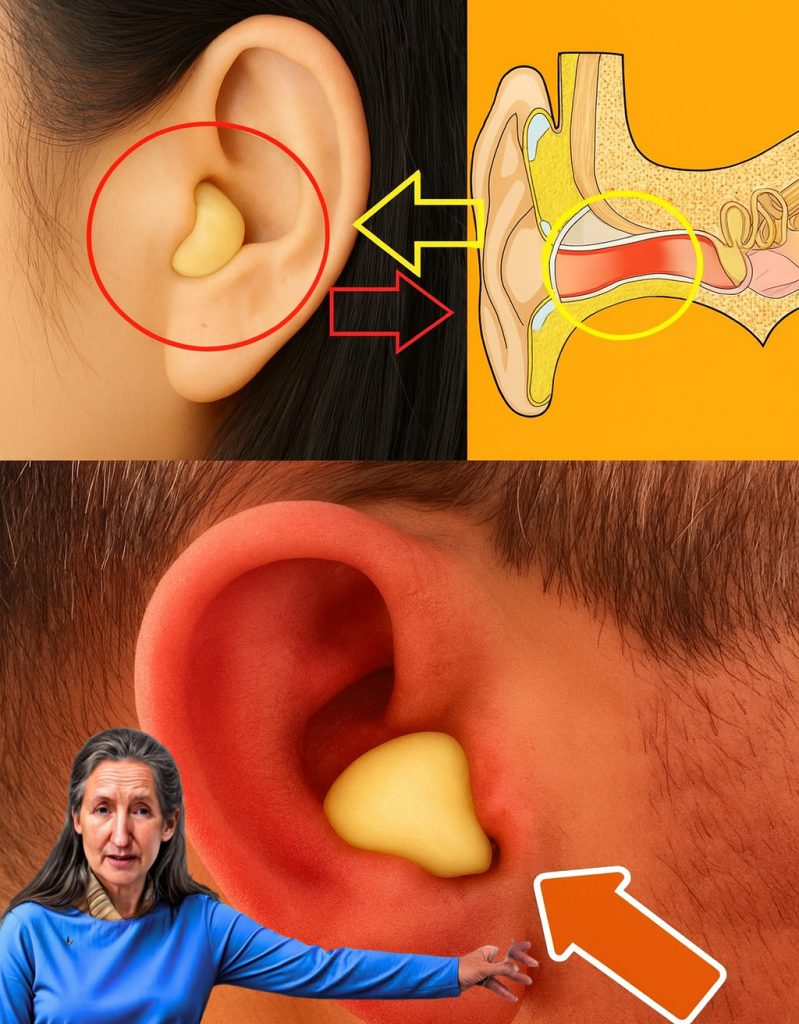What if two kitchen staples could support your hearing health naturally, saving you from costly treatments or devices? Garlic (Allium sativum) and onion (Allium cepa), long celebrated for their culinary zest, are emerging as potent allies for ear health, thanks to their antimicrobial, anti-inflammatory, and antioxidant properties. Used for centuries in traditional remedies across cultures, these pungent powerhouses may help combat ear infections, reduce inflammation, and improve blood flow to the delicate structures of the ear. While not a cure for hearing loss, their compounds—allicinin garlic and quercetin in onions—offer a natural, affordable way to support auditory wellness, especially for mild issues like ear infections or tinnitus. Ready to unlock the surprising benefits of garlic and onion for better hearing and learn how to use them safely? Let’s dive into this vibrant guide and harness nature’s duo to keep your ears humming!

👂 Why Garlic and Onion Matter for Hearing Health
Hearing loss affects over 15% of Americans over 18, with 9% of those aged 55–64 facing challenges, often due to infections, noise exposure, or age-related cochlear damage (). Ear infections, inflammation, and poor blood flow can exacerbate these issues, leading to muffled hearing or tinnitus (ringing in the ears). Garlic and onion, rich in bioactive compounds, offer a natural approach to support ear health by fighting infections, reducing inflammation, and enhancing circulation to the cochlea—the sensory organ crucial for hearing. While scientific evidence on their direct impact on hearing is limited, studies like one in Noise & Health (2018) highlight garlic derivatives’ protective effects against noise-induced hearing loss (). Traditional remedies, from Ayurvedic practices to European folklore, further endorse their use for ear infections and auditory support. Let’s explore their key benefits and practical uses for better hearing.

🌿 The Powerhouse Compounds in Garlic and Onion
Garlic: The Antimicrobial Champion
Garlic’s active compound, allicin, forms when cloves are crushed, delivering antibacterial, antiviral, and antifungal effects. A 2019 PMC study found garlic derivatives like S-allylmercaptocysteine (SAMC) and diallyl disulfide (DADS) reduced hearing threshold shifts in rats exposed to noise, protecting cochlear cells (). Garlic also improves blood flow, crucial for nourishing the cochlea, and reduces inflammation, which can alleviate ear discomfort.
Onion: The Antioxidant Ally
Onions, rich in quercetin (7 mg/100g) and sulfur compounds, combat oxidative stress that damages ear cells. A 2018 Noise & Health study suggested onion-water mixtures aided recovery from blast-induced cochlear damage in animals, likely due to quercetin’s antioxidant and anti-inflammatory properties (). Onions also support circulation, delivering nutrients to the auditory system.
Synergistic Benefits
Together, garlic and onion amplify each other’s effects, fighting infections, reducing inflammation, and protecting delicate ear structures. Their affordability (a bulb of garlic or onion costs ~$0.30–$0.50) makes them accessible compared to hearing aids ($1,000–$3,500 per ear) ().
🩺 Top Benefits for Hearing Health
1. Combats Ear Infections

Garlic’s allicin and onion’s sulfur compounds fight bacteria like Staphylococcus aureus and fungi like Candida albicans, common culprits in ear infections (). This can reduce infection-related hearing muffling.
How It Helps: By clearing infections in the outer or middle ear, they may prevent temporary hearing loss and discomfort.
2. Reduces Inflammation
Both ingredients’ anti-inflammatory compounds (allicinin garlic, quercetin in onions) reduce swelling in the ear canal or eustachian tubes, easing pressure and muffled hearing, as supported by a 2007 Nutrition & Food Science study ().
How It Helps: Less inflammation improves auditory nerve function and sound transmission.
3. Enhances Blood Flow
Garlic improves circulation by relaxing blood vessels, as noted in a 2014 Avicenna Journal of Phytomedicine review, while onions boost nitric oxide production, delivering oxygen to the cochlea ().
How It Helps: Better blood flow nourishes hair cells in the inner ear, potentially reducing tinnitus and supporting auditory health.
4. Protects Against Oxidative Stress
Antioxidants in garlic (vitamin C, selenium) and onions (quercetin, vitamin B6) combat free radicals that damage cochlear hair cells, a key factor in age-related hearing loss, per a 2018 American Journal of Clinical Nutrition study ().
How It Helps: Reduces oxidative damage, preserving hearing function over time.
5. May Support Noise-Induced Hearing Recovery
A 2018 Noise & Health study found garlic extracts (SAMC, DADS) and onion-water mixtures reduced permanent hearing threshold shifts in rats after noise exposure, suggesting protective effects ().
How It Helps: May aid recovery from temporary hearing loss caused by loud noise or blasts, though human studies are needed.
🥄 How to Use Garlic and Onion for Hearing Health
These remedies are designed for mild ear issues or preventive support, not severe hearing loss. Always consult a doctor for persistent symptoms. Here are safe, effective ways to use garlic and onion:
1. Garlic and Onion Juice Tonic
Ingredients:
- 30 ml fresh garlic juice (2–3 cloves, crushed and strained)
- 30 ml fresh onion juice (½ medium onion, blended and strained)
- 1 cup warm water
- Optional: 1 teaspoon raw honey (avoid for infants under 1)
Preparation:
- Crush 2–3 garlic cloves and let sit for 5 minutes to release allicin. Blend with ¼ cup water, strain through cheesecloth to collect juice.
- Blend ½ medium onion with ¼ cup water, strain to collect juice.
- Mix 30 ml each of garlic and onion juice with 1 cup warm water. Add honey for taste, if desired.
- Drink once daily on an empty stomach for 2–3 weeks to support circulation and immunity.
Benefits: Enhances blood flow to the cochlea and fights oxidative stress, potentially reducing tinnitus or mild hearing issues ().
Safety Note: Limit to 1 cup daily to avoid digestive upset. Stop if nausea or heartburn occurs.
2. Garlic Oil Ear Drops
Ingredients:
- 1 small garlic clove, minced
- 2 tablespoons olive or coconut oil
- Clean dropper
Preparation:
- Crush garlic and let sit for 5 minutes. Heat gently with oil in a small pan over low heat for 2–3 minutes (avoid smoking or bubbling).
- Cool to room temperature, strain through cheesecloth, and store in a sterilized glass dropper bottle (boil bottle for 10 minutes to sterilize) ().
- Apply 2–3 drops to the outer ear canal (not deep inside) of the affected ear, letting it sit for 5–10 minutes before draining onto a towel.
How to Use: Use twice daily for 3–5 days for mild ear infections or discomfort. Stop if irritation occurs.
Benefits: Garlic’s antibacterial properties may reduce outer ear infections (otitis externa), easing pain and muffled hearing ().
Safety Note: Never use with a perforated eardrum, as oil can worsen inner ear damage. Consult a doctor first ().
3. Onion Compress for Ear Relief
Ingredients:
- 1 small onion, chopped
- Clean dish towel or cheesecloth
Preparation:
- Sauté onion in ¼ cup water for 5 minutes until soft, or bake at 350°F for 10 minutes.
- Place warm (not hot) onion in a cloth, folding into a pouch.
- Apply to the affected ear for 10–15 minutes while lying down, ensuring no direct contact with the ear canal.
How to Use: Use once daily for 3–5 days to relieve mild ear pain or congestion from colds.
Benefits: Onion’s warmth and quercetin reduce inflammation and improve circulation, easing ear pressure ().
Safety Note: Avoid if skin is sensitive or if fever or severe pain is present.
4. Garlic and Onion in Diet
Preparation:
- Add 1–2 cloves of minced garlic and ½ cup chopped onions to daily meals (salads, soups, stir-fries).
- Alternatively, make a tonic by mixing 1 teaspoon each of garlic and onion juice with warm milk and a pinch of ghee.
How to Use: Consume daily for 2–3 weeks to support overall ear health via improved circulation and immunity ().
Benefits: Regular intake enhances blood flow and fights oxidative stress, potentially supporting cochlear health.
⚠️ Safety Precautions
Garlic and onion are potent but require careful use:
- Allergy Test: Apply a small amount of juice or oil to your inner wrist and wait 24 hours to rule out sensitivities (e.g., rash, itching), especially if allergic to Allium plants ().
- Avoid Internal Ear Use: Never insert garlic, onion juice, or oil deep into the ear canal, as they can worsen infections or damage the eardrum ().
- Medication Interactions: Garlic and onion may enhance blood thinners (e.g., warfarin), diabetes drugs, or antihypertensives, risking bleeding or low blood sugar/pressure. Consult a doctor if on medications ().
- Limit Use: Restrict juice tonics to 1 cup daily and ear drops/compresses to 3–5 days to avoid irritation or digestive upset.
- Not for Serious Conditions: These remedies don’t treat severe hearing loss, chronic otitis media, or tinnitus. Seek an ENT specialist for persistent symptoms ().
- Pregnancy/Breastfeeding: Avoid high doses due to limited safety data; consult a doctor.
- Source Quality: Use organic garlic and onions to avoid pesticides. Sterilize tools and containers to prevent contamination ().
🥗 Enhancing Benefits with Complementary Practices
To maximize garlic and onion’s effects, pair with these habits:
- Protect Ears: Wear earplugs in loud environments (e.g., concerts, construction) to prevent noise-induced hearing loss ().
- Antioxidant Diet: Include foods rich in vitamin C (oranges), vitamin E (almonds), and zinc (pumpkin seeds) to support ear cell health.
- Hydration: Drink 8–10 glasses of water daily to thin mucus and support ear drainage.
- Limit Irritants: Avoid smoking and excessive caffeine, which can worsen tinnitus or inflammation.
- Regular Check-Ups: Schedule annual hearing tests, especially if over 60, to monitor auditory health ().
🌟 Why Garlic and Onion Shine for Hearing Health
Compared to other remedies, this duo stands out:
- Affordable: Garlic and onions cost $0.30–$0.50 each, versus $1,000–$3,500 for hearing aids ().
- Natural and Safe: Free from synthetic chemicals, they avoid side effects of antibiotics or ear drops when used correctly ().
- Backed by Tradition and Science: Used in folk remedies for ear health, with studies supporting their antimicrobial and anti-inflammatory effects (,).
- Versatile: Easily incorporated into diets, tonics, or topical remedies, fitting any lifestyle.
🚨 When to Seek Professional Help
Garlic and onion support mild ear issues but aren’t cures for serious conditions. Consult an ENT specialist or doctor if:
- You experience persistent hearing loss, tinnitus, severe ear pain, fever, or discharge, which may signal otitis media, perforated eardrum, or other issues.
- Symptoms persist beyond 5–7 days of remedy use.
- You’re on medications like blood thinners, diabetes drugs, or antihypertensives, as garlic and onion may interact ().
- You have chronic conditions like diabetes or immune disorders, increasing ear infection risks.
Regular hearing tests are crucial, especially for seniors or those exposed to loud noise. Use garlic and onion as part of a doctor-approved plan ().
🌈 Boost Your Hearing Health Today
Garlic and onion aren’t just culinary stars—they’re a natural powerhouse duo for supporting hearing health, fighting infections, and reducing inflammation. From soothing ear discomfort with a warm compress to boosting circulation with a daily tonic, these remedies offer an affordable, science-backed path to better ear wellness. Why rely on costly treatments when nature’s finest are in your kitchen? Crush a clove, juice an onion, and let this duo work its magic. Start your garlic and onion journey today—your ears will thank you with clearer, vibrant sound!
This article is for informational purposes only and does not replace professional medical advice. Always consult a qualified healthcare provider before making changes to your health routine, especially if you have existing conditions or are taking medications.






